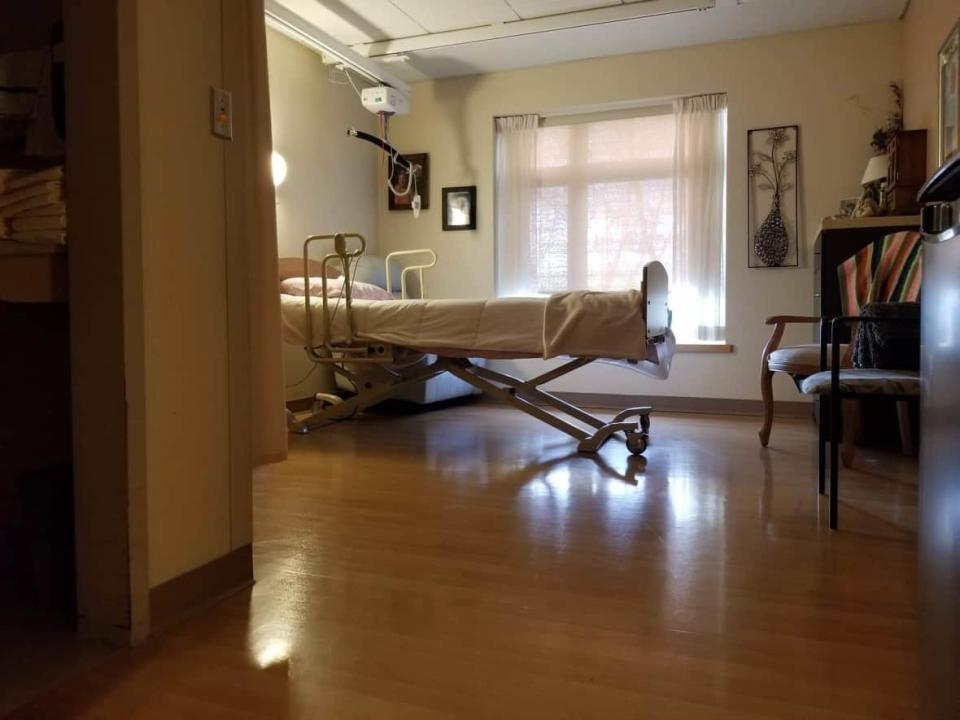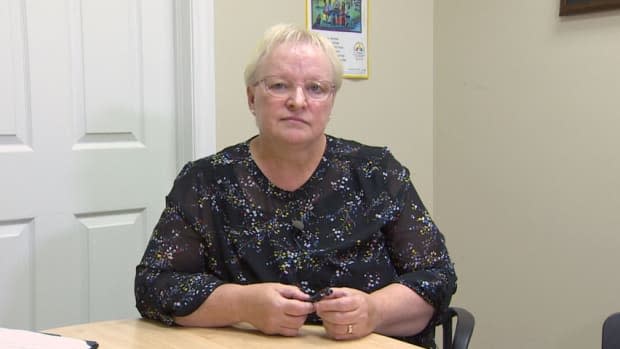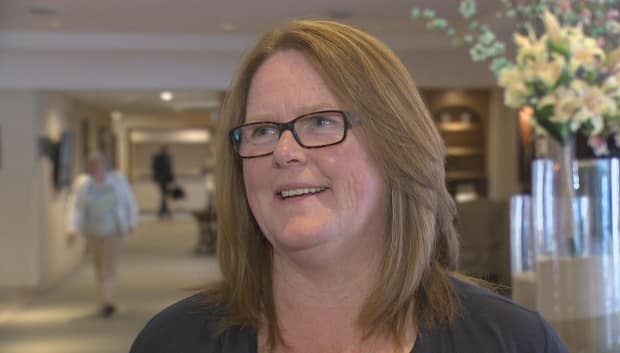Hundreds of nursing home beds sit vacant because of staff shortages

Nearly 300 nursing home beds in New Brunswick are vacant because the homes don't have enough employees to take care of more residents.
That's because there are nearly 400 job vacancies in the sector, hard-hit by the pandemic.
Meanwhile, hundreds of seniors are waiting to be placed in nursing homes; many of them stuck in hospital beds.
That, in turn, limits the number of emergency room patients who can be admitted to hospital — an issue that has raised concerns in recent months after several incidents, including the death of a man waiting for care at Fredericton's Dr. Everett Chalmers Regional Hospital ER, and a man being discharged from the same ER just hours after breaking his neck in a motorcycle crash.
The province has announced new nursing homes and plans to add nine in the coming years, a total of 600 more beds.
But it can't adequately staff the ones it has, said Cecile Cassista, executive director of the Coalition for Seniors and Nursing Home Residents' Rights.

"There's something wrong with this picture," she said.
Cassista has "deep concerns" about the care nursing home residents get, given the staffing shortages.
She has heard accounts from families of seniors being locked in their rooms, with no visiting, stimulation, or outings. Some residents are left in their pyjamas all day and go weeks with no bath, she said.
She is also worried about the strain on the existing staff and the impact on the hospital system.
Cassista is calling on the government to deal with the nursing home staff shortages and to implement uniform rules that would allow family members to visit their loved ones and assist with their care, even during COVID-19 outbreaks. In addition, she wants the government to find more suitable temporary placements, such as special care homes, for the seniors waiting in hospital beds.
"We no longer want lip service. We want action."
'Forgotten generation'
About 275 nursing home beds — about 5.5 per cent of the province's 4,953 beds — were vacant as of the end of July, according to the Department of Social Development.
The majority of vacancies are due to staffing shortages, the department confirmed, although there are other factors, including closures due to COVID outbreaks.
There were 775 seniors waiting to get into nursing homes, as of the end of July, according to Cassista, up from 720 in June.
Of those, 429 were in hospitals, a 12 per cent jump from June's 382—an "outrageous" number, she said, noting it hovered around 70 in the mid-2000s.
Now, the Moncton region, Zone 1, and Saint John region, Zone 2, alone each have more than that, at 103 and 94, respectively, according to figures the coalition obtained from Social Development.
"Four hundred languishing in a hospital bed is not acceptable," said Cassista.
"It just seems that these are the forgotten generation. People are not paying attention, and it's very difficult for the family member[s] to speak out. They're afraid of reprisals."
Filling positions 'a high priority'
Seniors advocate Kelly Lamrock said he is aware of the "trend" of nursing home beds being left vacant due to because of staff shortages.
But he said he could not offer further comment, since he hasn't fully investigated the issue.
Social Development Minister Dorothy Shephard said the number of vacant nursing home beds causes her "great concern," as does the number of seniors waiting in hospital beds, where they're "not getting the optimal care that they deserve."
"We need to get them into nursing homes as quickly as possible for their own benefit, but two, having those beds empty will free up resources at hospitals so that patients can be moved out of the ER into floors."

Filling the nursing home staff vacancies "has got to be a high priority" for her department, along with the departments of Health and Post-Secondary Education, Training and Labour, Shephard said.
She said the province hopes to work with both the New Brunswick Association of Nursing Homes and the employee union to try to raise staffing levels and make sure all beds are used.
Union 'deeply alarmed' heading into fall
Sharon Teare, president of the New Brunswick Council of Nursing Home Unions, says employers and employees are both doing the best they can with the resources they have. But it's not enough.
"The union is deeply alarmed as to what nursing homes will look like if we don't address with some real incentives to have staffing in place to care for our seniors."
The reality the frontline workers face every day is heartbreaking, said Teare. She cited the example of a worker at a home where each employee takes care of 19 residents.
I'm sure there's not a family member out there who would be OK with their loved one, you know, [receiving] compromised care, because that's where we're at today because of the lack of staffing. - Sharon Teare, New Brunswick Council of Nursing Home Unions president
"And then she's left to go home and tend to her own family, you know, with no time left to care for herself," she said.
"You cannot provide adequate care if you're not caring for the worker who cares for the seniors."
Difficult working conditions related to staff shortages are causing employees to leave and preventing the nearly 400 permanent, part-time and casual positions from being filled, said Teare.

Workers are exhausted — physically, emotionally and mentally, she said.
"The overall mental health of our workforce is depleted. It has taken an extreme toll. I mean, understanding that as a nursing home worker, you take great honour in being able to care for our most valuable seniors.
"And when you're not able to have the adequate resources, such as staffing, to be able to do that, it most certainly takes a drain because you know you're not able to give them or provide all of what it is that they deserve."
Wages don't reflect the actual work employees do, according to Teare. Some may be doing the work of three people but getting paid the salary of only one, she said. "That's not what I consider fair."
Nurses to kitchen staff needed
Julie Weir, CEO of the New Brunswick Association of Nursing Homes, says the long-term care industry is struggling to find employees just as other industries are.
"It is a national issue. And we're competing against one another in terms of provinces to be able to bring people in, to be able to fill these positions."
It's not just care positions, such as nurses, she noted, but a wide range of employees, including kitchen staff.
"We've known that the shortage has been coming our way," said Weir, referring to the aging population, more people retiring, more people requiring care and a shrinking pool of working-age people. "We've just never felt it quite as prominently as we are at this time."
The past two years of the pandemic have made it more challenging to replace people who retire, she said, citing COVID-19 travel restrictions as an example.
One step the province took last year was to make it more affordable for New Brunswickers to train to become personal support workers, or PSWs. The Department of Post-Secondary Education, Training and Labour announced last August that full tuition fees would be covered.
Nearly 900 people were trained, the department said.

A total of 215 WorkingNB clients had their tuition at the college programs offered across the province covered. An additional 677 people were trained on-site by employers, who will be reimbursed by the province.
The union was optimistic when the program was announced, said Teare. "But we didn't see any of those students in the program come to nursing homes."
Instead, they went to work in other fields, such as hospitals and community care, she said.
Teare recently submitted a recommendation to have paid tuition for personal support workers designated solely for nursing homes. Graduate would have to work in a nursing home for a minimum of six months, she said.
"Because I think once you're exposed to the sector, it is very rewarding when you're not overworked."
The need for personal support workers is growing, according to the Labour Department. Labour market forecasts indicate thousands of them will be needed over the next 10 years.
The latest forecasts show there will be more than 500 PSW job openings per year.
'Rowing in the same direction'
The association is working with the government departments to find ways to find PSWs and other employees, said Weir.
"We are working very well together because we need one another through this."

Not only are they competing against other provinces, she said, but they are often competing against each other for the workers who do come.
"So we need to have a concerted front and make sure that we're all in the boat rowing in the same direction."
The association is trying to recruit internationally educated nurses from other countries, hoping they will choose to practise in the long-term care sector, for example, but encouraging them to work in whichever sector they want.
It's also holding job fairs across Canada, trying to entice workers to come to New Brunswick, based on the lifestyle and the cost of living.
Teare welcomes the recruitment efforts, but said they don't address the current "critical staffing issues."
"So we're asking for immediate incentives to draw those individuals into the sector — universal policies within the nursing homes. So it's continuity and consistency of application, which is extremely important, as well as bringing in some mental health [programs] to address the impacts that those … currently on the front line are facing."
The union is also working on a profile of the sector to help attract staff and shed light on what Teare called the "lack of resources" the province gives employers to operate their nursing home.

 Yahoo Movies
Yahoo Movies 